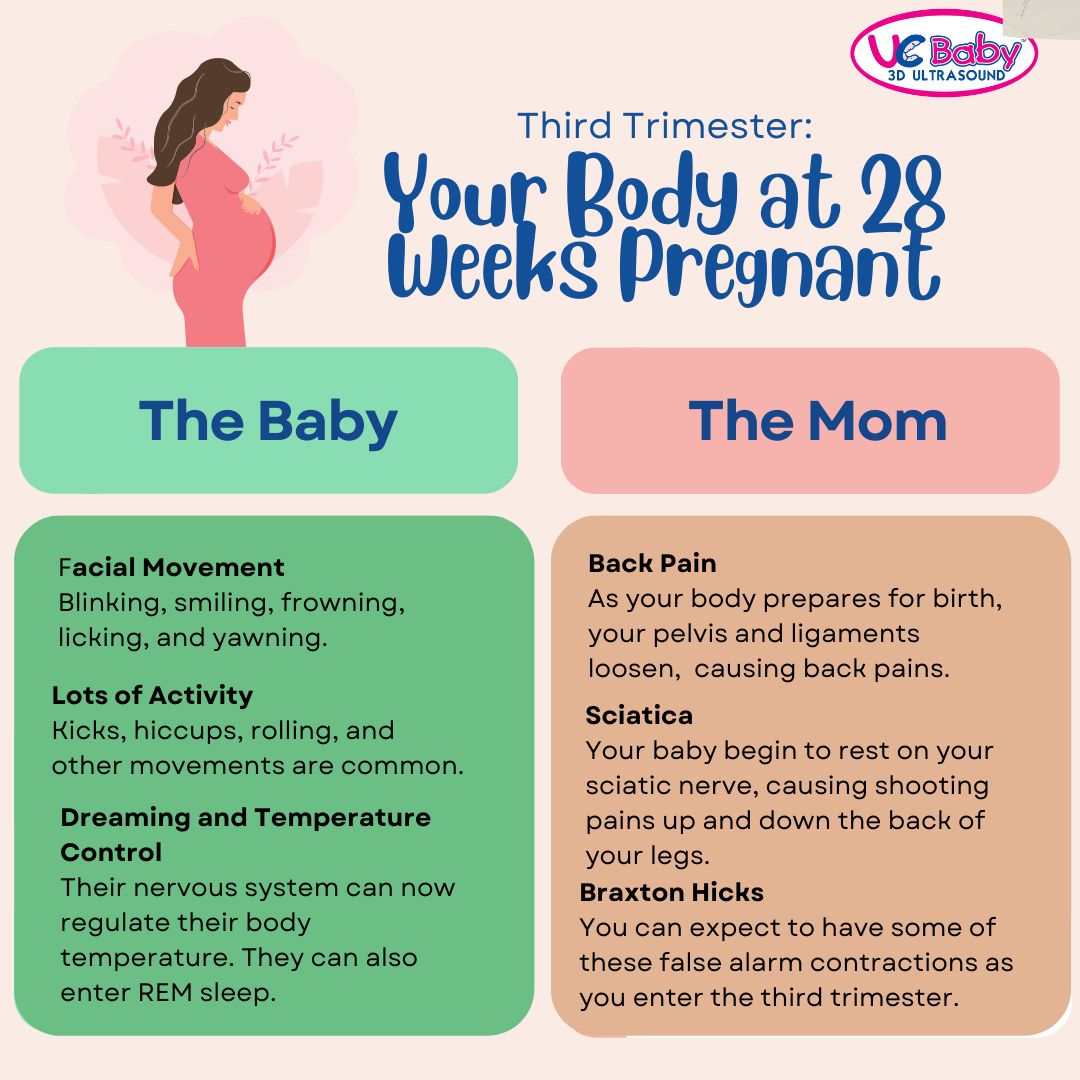Congratulations! You’ve made it to the beginning of your third trimester, and you’re probably eager to know what exciting surprises lie ahead in this final stretch of your pregnancy. Prepare for a new set of changes as you and your baby prepare for the big arrival!
What is the Third Trimester of Pregnancy?
The third trimester of pregnancy is the final stage before giving birth. It begins in week 28 and lasts until week 40 of pregnancy, which is the standard gestational period. This trimester is marked by significant physical changes for the mother.
The baby grows rapidly during this time, reaching full development and gaining weight. The mother may experience discomfort due to the increasing size of her abdomen and the pressure on her organs. Common symptoms during the third trimester include frequent urination, heartburn, backaches, and difficulty sleeping.
It is important for expectant mothers to take care of themselves during this time, maintaining a healthy diet, exercising regularly, and attending prenatal check-ups. Towards the end of the third trimester, the baby may start to move lower into the pelvis, preparing for birth. Finally, as the trimester comes to a close, it is a sign that the baby is near arrival and the mother will soon be ready to give birth.
Let’s explore what you can expect during your 28th week of pregnancy, both for yourself and for your growing little one.
Watch: Third Trimester: Your Body at 28 Weeks PregnantAt 28 weeks of Pregnancy: The Baby at the Third Trimester
Facial Movements
Your precious bundle of joy is becoming quite an expressive little being. By now, they have gained more control over their facial muscles and can even blink their adorable eyes. And guess what? A tiny set of eyelashes has also developed, making those blinks even more enchanting! Plus, thanks to their newfound skills, they might stick out their little tongues—often caught on 3D or HD 5D ultrasounds—showing off just how cute they are. You may even witness them smiling, frowning, licking their lips, or yawning inside the cozy confines of your womb.
Lots of Activity
As your baby approaches the two-pound milestone, their movements become more pronounced. Expect a flurry of kicks, hiccups (which might feel like gentle taps from within), rolling sensations as they shift positions and various other delightful movements that give you a glimpse into their developing personality. This is an ideal time to start counting kicks and note when your baby is most active—a beautiful way to bond with them before they enter the world.
Dreaming and Temperature Control
It’s astonishing how advanced your baby’s brain is at this stage. Their nervous system has matured enough to regulate body temperature—a skill that will be useful once they enter the world. But wait…there’s more! They can now experience Rapid Eye Movement (REM) sleep—the phase associated with dreaming. Imagine the wonders and adventures that unfold in their tiny dreams!

At 28 weeks of Pregnancy: The Mom during the Third Trimester
Back Pain
As your body readies itself for childbirth, you may notice a change in your gait—a subtle waddle—due to the loosening of your pelvis and ligaments. Unfortunately, this adjustment can manifest as back pain, sometimes causing discomfort during this stage of pregnancy. But fear not! There are ways to find relief. Engaging in gentle yoga, regular stretching exercises designed for expectant mothers, or seeking guidance from a healthcare professional can help alleviate those pesky aches and pains.
Trouble Sleeping
Ahh, sleep…a wonderful but elusive companion as you advance through pregnancy. Your growing baby’s increased activity, coupled with your expanding belly, might disrupt your peaceful slumber. It’s normal to experience bouts of insomnia or trouble finding a comfortable position at night. Thankfully, exercise can come to the rescue once again! Engaging in physical activities during the day might tire you out, promote relaxation when bedtime rolls around, or provide an energy boost after a sleepless night.
Sensitive Skin
Your body has been working tirelessly to nurture and support the growing life within you, which means it’s also going through some significant changes. As a result, you may notice that your skin becomes more sensitive and reactive than usual. Don’t be surprised if it starts reacting differently to products you’ve been using without issue before—developing rashes, dryness, oiliness, flakiness—the works! In such cases, opting for milder skincare options could be beneficial in managing these skin-related challenges.
Braxton Hicks
As you enter the third trimester, occasional false alarm contractions known as Braxton Hicks may appear. These contractions are typically infrequent and spaced far apart and should signal that your body is preparing for labor. However, if they become frequent or more intense, reaching out to your OB/GYN is always a good idea just to be safe. Remember, every pregnancy is unique!
Shortness of Breath
Your amazing little one is now occupying space once occupied by your other vital organs—your lungs and diaphragm. As your baby grows, it’s only natural that you might experience moments of breathlessness or find it challenging to catch your breath after any physical activity. It’s important to listen to your body and take breaks when needed. If the shortness of breath becomes concerning or persistent, don’t hesitate to discuss it with your healthcare provider for reassurance.
Sciatica
Sciatica is a pesky condition that can arise as the baby shifts position and puts pressure on your sciatic nerve. This may lead to shooting pains running up and down the back of your legs—an unwelcome addition to the various quirks of pregnancy! While some lucky individuals experience relief as their pregnancy progresses, others may endure this discomfort until the delivery day arrives. Applying heating pads or opting for rest with gentle exercises is recommended.
Third Trimester: Health and Nutrition
As you enter the final stretch of your pregnancy, it’s important to continue prioritizing your diet and nutrition. The third trimester is a critical time for both you and your baby’s development, so let’s dive into some specific recommendations.
Staying Hydrated
First and foremost, staying hydrated becomes even more crucial during this stage. Your body is working harder than ever, and adequate hydration supports proper circulation, digestion, and overall health. Aim to drink at least eight glasses of water per day, but listen to your body’s signals and increase intake if needed.
Managing Constipation
As your baby grows larger, they can put pressure on your digestive system, leading to slowed bowel movements. To manage constipation effectively, focus on incorporating fiber-rich foods into your diet, such as whole grains, fruits, vegetables, legumes, and nuts. Additionally, consider adding a natural stool softener like prunes or flaxseeds to help alleviate discomfort.
Engaging in Physical Activity
Although energy levels may be lower during the last few months of pregnancy due to increased physical demands on your body, maintaining regular exercise and physical activity is still important. Consult with your healthcare provider about suitable exercises that are safe for you and your baby at this stage. Prenatal yoga or swimming are often recommended as they provide gentle yet effective ways to stay active while minimizing strain on joints.
Monitoring Blood Pressure
Regular monitoring of blood pressure is crucial during the third trimester as changes in blood pressure can indicate potential complications such as preeclampsia or gestational hypertension. Make sure to attend all prenatal check-ups where blood pressure measurements will be taken; this allows healthcare professionals to monitor any deviations from the norm closely.
Managing Gestational Diabetes
Gestational diabetes is another condition that may arise in late pregnancy. It occurs when hormonal changes prevent insulin from effectively regulating blood sugar levels. If diagnosed with gestational diabetes by your healthcare provider through glucose screening tests around 24-28 weeks gestation or later, a specialized diet plan or additional medical interventions may be necessary. Remember, managing gestational diabetes is crucial for both your well-being and your baby’s health.
Mental Preparation and Emotional Readiness
Aside from these physical aspects, it’s essential to prepare for childbirth and breastfeeding during the third trimester mentally. Consider enrolling in prenatal classes or workshops that focus on labor techniques, relaxation methods, and breastfeeding education. These resources can equip you with valuable knowledge and boost your confidence as you approach the delivery day.
Potential Complications during Pregnancy
When it comes to pregnancy, there can be potential complications that you should be aware of. These complications could affect both you and your baby, and understanding them is key to ensuring a healthy pregnancy journey.
Gestational Diabetes
This refers to high blood sugar levels that develop during pregnancy. It’s important to monitor your blood sugar levels regularly and follow any dietary changes or medication prescribed by your healthcare provider. By effectively managing gestational diabetes, you can reduce the risk of complications for both you and your baby.
Preeclampsia
Preeclampsia is a condition characterized by high blood pressure during pregnancy. This can have serious implications for both mother and baby if left untreated. That’s why it’s crucial to work closely with your healthcare provider to monitor your blood pressure regularly and take any necessary steps to manage it effectively.
Preterm Labor
Preterm labor refers to giving birth before 37 weeks of gestation, which can lead to various challenges for the baby’s development and overall health. Your healthcare provider will guide you on strategies to help prevent preterm labor, such as maintaining a healthy lifestyle, attending regular prenatal visits, and following any specific instructions given.
Placenta previa
This condition happens when the placenta partially or completely covers the cervix. Placenta previa can cause bleeding and other complications throughout pregnancy. If diagnosed with placenta previa, your healthcare provider will closely monitor you and discuss appropriate management options based on the severity of the condition.
This is just an overview of potential complications. Every pregnancy is unique, and it’s essential to have open communication with your healthcare provider throughout your journey. They will guide you appropriately, monitor your health, and address any concerns or complications that may arise.
Just remember, you’re almost to the finish line. You have been through so much, but it will all be worth it when you hold your baby. It is also important to note that these symptoms may not appear in some people, or you may develop different symptoms. Most of these will go away eventually or after birth.
REFERENCES:
Check out our blog – Stages and Phases of Childbirth





 Invite families and friends to witness this memorable event of your pregnancy. Celebrate that special child-bonding moment with your loved ones, wherever they are in the world.
Invite families and friends to witness this memorable event of your pregnancy. Celebrate that special child-bonding moment with your loved ones, wherever they are in the world. There is nothing more beautiful than your baby's heartbeats. Save that sound forever in a UC Baby® Heartbeat Bear®. It's not just a great keepsake, but also an effective way to sooth your baby to sleep.
There is nothing more beautiful than your baby's heartbeats. Save that sound forever in a UC Baby® Heartbeat Bear®. It's not just a great keepsake, but also an effective way to sooth your baby to sleep.